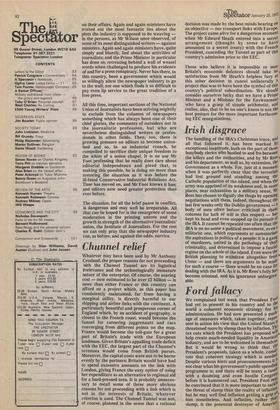Chunnel relief
Whatever may have been said by Mr Anthony Crosland, the proper reasons for not proceeding Wth the Channel Tunnel are its logistical irrelevance and the technologically immature nature of the enterprise. Of course, the soaring cost — now estimated to be over £2 billion — is more than either France or this country can afford on a project which, as this paper has consistently maintained, far from having a marginal utility, is directly harmful to our shipping and airline links with the continent. A particularly beautiful and prosperous corner of England which, by an accident of geography, is closest to the French coast, would become the funnel for careering juggernauts and cars converging from different points on the map. France would become the toll-gate for a great part of Britain's trade with the European landmass. Given Britain's appalling trade deficit with the EEC, the largest part of the Chunnel's revenues would come from British purses. Moreover, the capital costs were not to be borne evenly by the partners: Britain would have had to spend excessive amounts on the link with London, giving France the easy option of using her expenditure as an alternative to regional aid for a hard-pressed area. It is probably unnecessary to recall some of these more obvious reasons for not proceeding with a link which is not in the interests of Britain, whatever criterion is used. The Channel Tunnel was not, of course, planned in the sense that a rational decision was made by the best minds bearing on an objective — our transport links with Europe. The project came alive for a dangerous moment when Mr Edward Heath entered into a secret arrangement (thought by some to have amounted to a secret treaty) with the French President, conceding the Tunnel as part of this country's admission price to the EEC.
Those who believe it is impossible to man Britain's economic defences should take noi satisfaction from Mr Heath's helpless fury at this sober decision to cancel unilaterally a project that was to have been the symbol of this country's political subordination. We should consider ourselves lucky that we have a Prime Minister and a Minister for the Environment who have a grasp of simple arithmetic, and realise, also, that to be on one's knees is not the best posture for the more important forthconv ing EEC renegotiations.


























 Previous page
Previous page